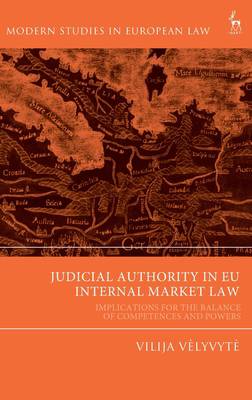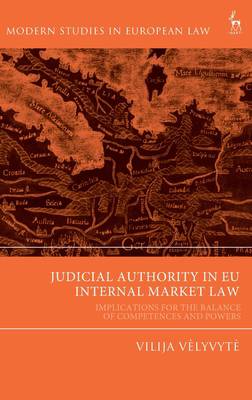
- Afhalen na 1 uur in een winkel met voorraad
- Gratis thuislevering in België vanaf € 30
- Ruim aanbod met 7 miljoen producten
- Afhalen na 1 uur in een winkel met voorraad
- Gratis thuislevering in België vanaf € 30
- Ruim aanbod met 7 miljoen producten
Judicial Authority in EU Internal Market Law
Implications for the Balance of Competences and Powers
Vilija VelyvyteOmschrijving
This book examines the role of the European Court of Justice in the regulation of the internal market from a competence perspective. However, rather than focusing on the Court's role in enforcing the limits of EU competence in the EU's political decision making, it explores a related, albeit understudied, question: to what extent does the Court observe the constitutional limits of EU competence and its own institutional powers in the interpretation of EU internal market law laid down in the Treaties? The book provides an answer to this question through the analysis of EU free movement case law in light of the constitutional principles that govern the allocation of competences and powers in the EU: conferral, subsidiarity and proportionality, on the vertical level, and institutional balance, on the horizontal level. Why should the Court be bound by these principles? What do they mean when applied to judicial practice? To what extent are they observed in the free movement case law? The book argues that the Court's observance of the four principles has been inconsistent, thereby creating substantive and constitutional tensions in the EU's relationship with the Member States and upsetting the institutional balance of powers between the EU legislature and judiciary.
Shortlisted for the UACES Best Book Prize 2023Runner-up of the 2024 Peter Birks Prize for Outstanding Legal Scholarship
Specificaties
Betrokkenen
- Auteur(s):
- Uitgeverij:
Inhoud
- Aantal bladzijden:
- 312
- Taal:
- Engels
- Reeks:
Eigenschappen
- Productcode (EAN):
- 9781509938995
- Verschijningsdatum:
- 17/11/2022
- Uitvoering:
- Hardcover
- Formaat:
- Genaaid
- Afmetingen:
- 156 mm x 234 mm
- Gewicht:
- 603 g

Alleen bij Standaard Boekhandel
Beoordelingen
We publiceren alleen reviews die voldoen aan de voorwaarden voor reviews. Bekijk onze voorwaarden voor reviews.











